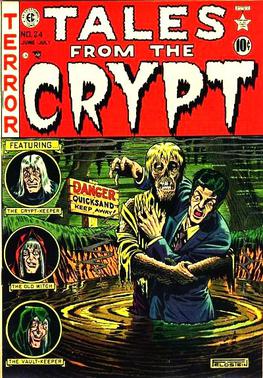A secret identity is a person's alter ego which is not known to the general populace, most often used in fiction.
Secret identity may also refer to:
A secret identity is a person's cryptonym, incognito, cover and/or alter ego which is not known to the general populace, most often used in fiction. Brought into popular culture by the Scarlet Pimpernel in 1903, the concept was widespread in pulp heroes and is particularly prevalent in the American comic book genre, and is a trope of the masquerade.
An alter ego means an alternate self, which is believed to be distinct from a person's normal or true original personality. Finding one's alter ego will require finding one's other self, one with a different personality. The altered states of the ego may themselves be referred to as alterations. A distinct meaning of alter ego is found in the literary analysis used when referring to fictional literature and other narrative forms, describing a key character in a story who is perceived to be intentionally representative of the work's author, by oblique similarities, in terms of psychology, behavior, speech, or thoughts, often used to convey the author's thoughts. The term is also sometimes, but less frequently, used to designate a hypothetical "twin" or "best friend" to a character in a story. Similarly, the term alter ego may be applied to the role or persona taken on by an actor or by other types of performers.
Starman, Star Men, or variations, may refer generally to any space traveller, or more specifically to:
Animus may refer to:
Swag, SWAG, or Swagg may refer to:
Unknown Soldier is a fictional war comics character in the DC Comics Universe. The character was created by Robert Kanigher and Joe Kubert, first appearing in Our Army At War #168. The character is named after The Tomb of the Unknown Soldier at Arlington National Cemetery, Virginia. The character of the Unknown Soldier is symbolic of the nameless soldiers that have fought throughout America's wars; as stated in his first featured story "They Came From Shangri-La!", he is the "man who no one knows — but — is known by everyone!" Another nickname for the character used in the series is "The Immortal G.I."
Dope may refer to:

"The Last Night of a Jockey" is an episode of the American television anthology series The Twilight Zone. In this episode, a diminutive jockey's wish to be a big man is granted. Rod Serling wrote the episode specifically for Mickey Rooney, who is the only actor to appear in it.
An alter ego is an alternate personality or persona.

Joseph Maneely was an American comic book artist best known for his work at Marvel Comics' 1950s predecessor, Atlas Comics, where he co-created the Marvel characters the Black Knight, the Ringo Kid, the Yellow Claw, and Jimmy Woo.
Ultraman or Ultra Series is a collective name for all media featuring the Ultraman character.
Getsumento Heiki Mina was a fictitious anime which appeared in the television miniseries Densha Otoko. In the same manner as Kujibiki Unbalance, an anime that began as a fictitious anime/manga within the anime/manga Genshiken, it has been adapted into a television series, which itself was later adapted into a manga series. Originally conceptualized by Kazuya Tsurumaki, the 11-episode series was produced by Gonzo, Fuji TV, Pony Canyon and GDH and directed by Keiichiro Kawaguchi, with Junki Takegami handling series composition, okama and Takashi Kumazen designing the characters and Kousuke Yamashita composing the music. The anime first aired on January 13, 2007 on Fuji TV and ran until March 24, 2007.

The Fox is the name of two fictional superheroes that appear in periodicals published by MLJ Comics and later Dark Circle Comics.
Secret History or Secret Histories may refer to:

Komiks Presents: Kapitan Boom is the first fantaserye offering in the Komiks series aired on ABS-CBN. This series is based on the comic strip Kapitan Boom by Mars Ravelo.

Horror comics are comic books, graphic novels, black-and-white comics magazines, and manga focusing on horror fiction. In the US market, horror comic books reached a peak in the late 1940s through the mid-1950s, when concern over content and the imposition of the self-censorship Comics Code Authority contributed to the demise of many titles and the toning down of others. Black-and-white horror-comics magazines, which did not fall under the Code, flourished from the mid-1960s through the early 1980s from a variety of publishers. Mainstream American color comic books experienced a horror resurgence in the 1970s, following a loosening of the Code. While the genre has had greater and lesser periods of popularity, it occupies a firm niche in comics as of the 2010s.
Crimebuster or crime busters or variation, may refer to:
Alter Egos is a 2012 American superhero comedy film written, edited, and directed by Jordan Galland. The film, starring Kris Lemche, Sean Lennon, Danny Masterson, and Geneva Carr, was distributed by Kevin Smith's SModcast Pictures and Phase 4 Films. It premiered was at the Fantasia Film Festival on July 24, 2012, where it was chosen as an official selection.
Invisible Boy or variant, may refer to:
Batgirl is a DC Comics superheroine character, the alter-ego of several characters in the Batman fictional milieu.